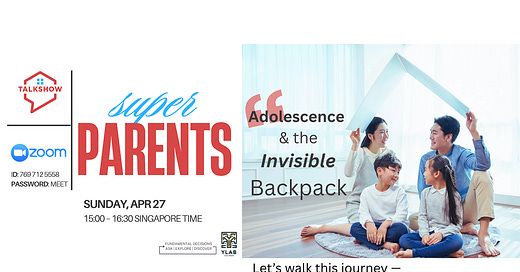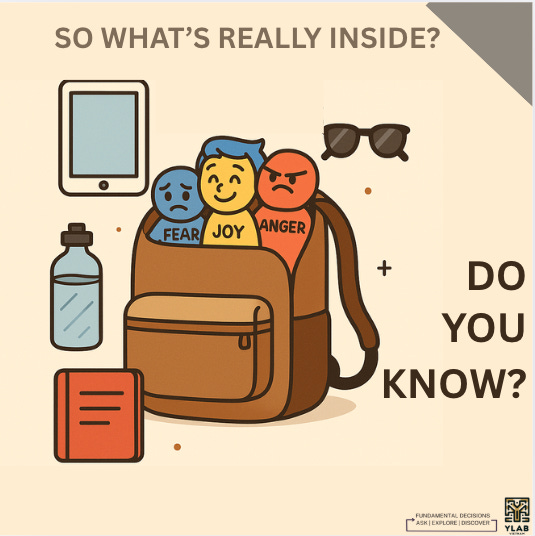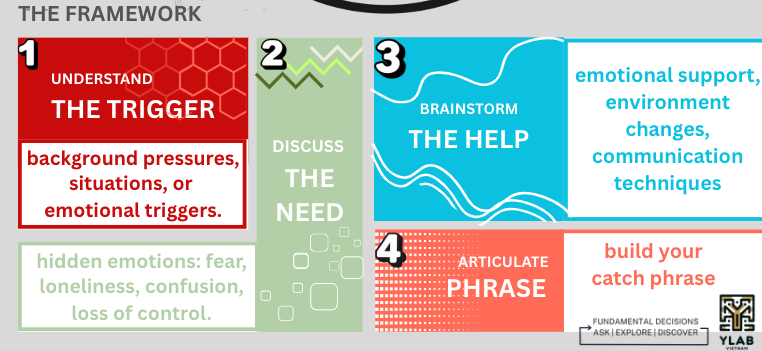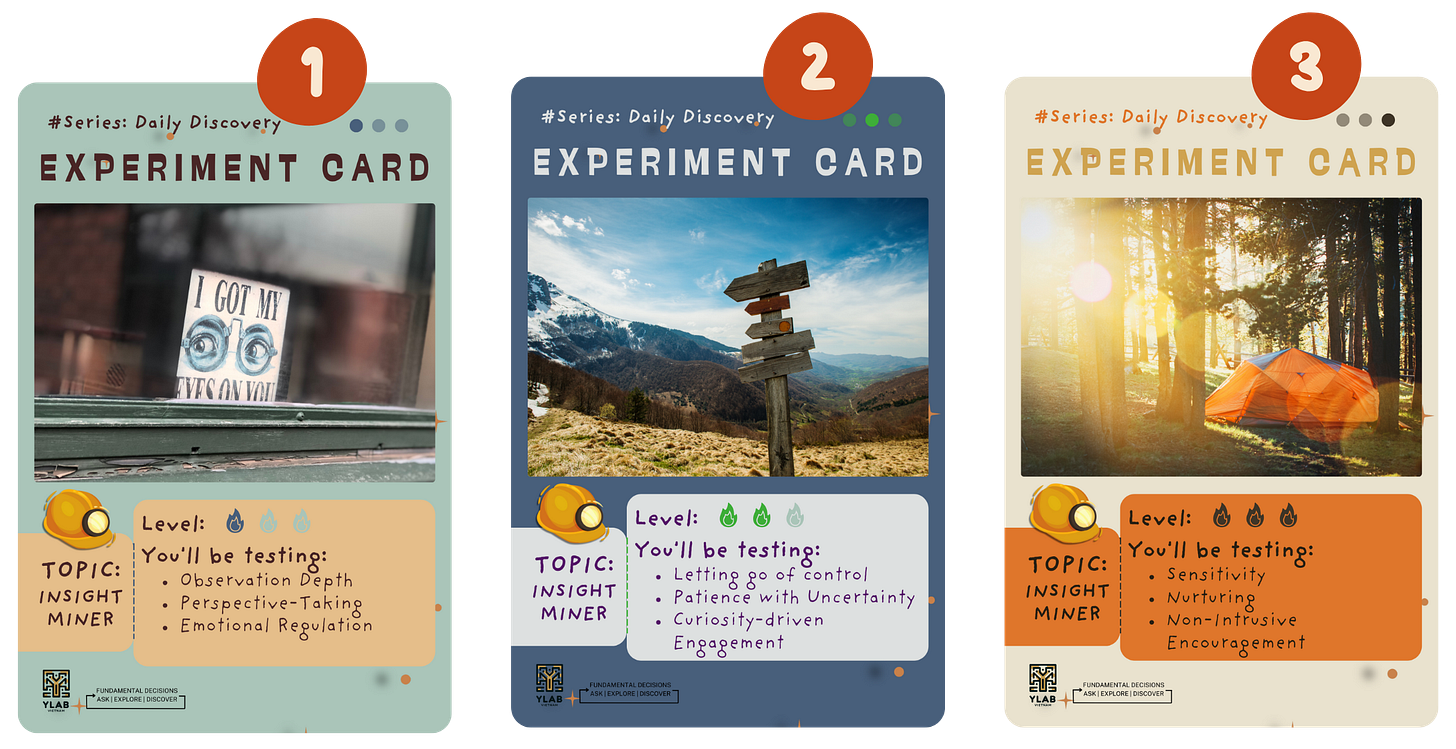S4.C6. Peace and Happiness - Resilience in Action
A discussion around how the rise of instant gratification, pressure from modern parenting norms, and shifts in society have affected how kids learn, cope, and thrive.
The session was initiated to explore the realities of adolescence today……
A. HOW THE DISCUSSION UNFOLDS
Date of Talk Show: April 27
Time: 15:00 – 16:30 SGT
Core Theme: Peace, Happiness & Resilience in Action
Tagline: “Let’s walk this journey — not ahead of our children, but with them.”
Organized by: Super Parents, Fundamental Decisions
Platform: Facebook Group + Substack (EduWhiz S4C5: Adolescence Unpacked)
1. Participant Arrival , Introductions and the Agenda
As members gradually joined the session, DAV79 and LIN91 worked in tandem to coordinate welcome messages and timely reminders, ensuring a smooth onboarding experience.
As they finalized the technical setup, DAV79 noted:
"We'll start the recording once more people join. It's a Sunday after all, so attendance might be lighter."
Soon after, Dr. Huong Giang joined the session. DAV79 welcomed her warmly:
"Dr. Huong Giang, you can switch on your camera if you're comfortable!"
Dr. Huong Giang responded modestly but preferred to keep her camera off.
Chris, dialing in from Shanghai, also entered during this time, apologizing as he was parking his car:
"Give me a minute to park first!" Chris said, to which DAV79 laughed and reassured: "No worries, Chris. Take your time!"
Understanding the challenges of convening parents on a Sunday—a time often reserved for family commitments—DAV79 addressed the group candidly. He acknowledged that attendance might fluctuate but emphasized a key principle: the value of commitment to growth transcends numbers. Whether five or fifty participants, the spirit of the session would remain the same—focused, purposeful, and dedicated to delivering meaningful engagement.
This mindset served to subtly recalibrate expectations, shifting focus away from quantity toward quality of participation. It also demonstrated leadership presence, reassuring those present that their time and presence mattered. DAV79’s opening approach laid a thoughtful foundation: participants were not merely attendees; they were contributors to a shared experience, one built on mutual respect, active involvement, and the collective pursuit of deeper understanding.
2. Navigating the Content
The session opened with a five-minute welcome to build trust and set expectations, emphasizing that all participant perspectives are valuable. As DAV79 was explaining the agenda itself, he shared that the session would move through several key phases, designed to guide participants from self-awareness to global responsibility.
Participants would first spend twenty minutes exploring the "Invisible Backpack" metaphor, reflecting on the unseen advantages and assumptions shaped by their backgrounds.
The core of the workshop would be the forty-minute "Reflection Circles," where participants would share and listen to diverse experiences, deepening their understanding through dialogue.
Following that, a fifteen-minute "Global Citizen" segment would shift the focus from personal privilege to global responsibility, encouraging ethical engagement with broader societal challenges.
Finally, a ten-minute wrap-up would consolidate insights and motivate participants to apply their learning beyond the session.
DAV79 , chuckled , "We will try to stay on time… hopefully."
Many Faces, Many Places, One Purpose: Empowering others to own the mindset they choose.
Each participant briefly introduced themselves:
DAV79: Behavioral researcher specializing in understanding and triggering human behavior.
LIN91: Specialist in AI and technological integration into education.
SAHN: Coach, mentor, and self-described “confused parent”.
Guest participants:
Chris (Shanghai): Works in career education.
Silvia (Indonesia): NGO worker focused on education and social development.
Dien (Vietnam): Researcher in esoteric sciences.
Dr. Huong Giang (Vietnam): Biotech scientist from the Vietnam Academy of Science and Technology.
Veena (London): English teacher and parent of a young adult.
Trung (Vietnam): University lecturer and parent.
Some other members who joined a little later and one way after (joking - but appreciate the determination of those who made it. )
Jency (Germany)
Zeenath (Oman)
Matthew Ryan (Hanoi) - Australian Expert in Mindfulness
I Putu Buderiasa (Bali, Indonesia)
Truong Van Anh (Vietnam)
Kieu Oanh Nguyen ( Vietnam)
3. Purpose of the Gathering
DAV79 formally set the context: the gathering was part of Fundamental Decisions' broader mission to prioritize mindset development over mere skills acquisition. He shared that this session was partly inspired by the documentary series Adolescence, which captures the complex psychological and emotional landscapes teenagers navigate today.
Introducing the core focus of the session, DAV79 stated, "All children seek one thing: a reason to feel proud of who they truly are." He urged participants to engage fully—embracing the roles assigned to them and pushing back where necessary—to experience the session with authenticity and depth.
LIN91 then provided a deeper dive into the philosophy behind Fundamental Decisions. She emphasized that modern parents and educators are increasingly overwhelmed by endless advice, trends, and methodologies. While skill-building remains important, it is no longer sufficient; developing a resilient mindset is critical for long-term success. Education, she argued, must empower learners, parents, and educators alike to navigate uncertainties, rather than simply closing skill gaps.
"The future belongs to those with a strong mind," LIN91 affirmed, highlighting that parenting and learning are not static achievements but continuous transformation processes.
Their points were strongly anchored in research: Harter (2012) noted that across cultures, children fundamentally seek validation of their authentic selves. A longitudinal study by Trzesniewski et al. (2006) found that positive self-concept predicted stronger academic outcomes and emotional resilience. The Harvard Center on the Developing Child (2021) emphasized that supportive environments fostering self-esteem build critical neurological foundations. Dweck’s (2016) research further showed that environments promoting growth and personal value significantly enhance motivation and resilience—two essential elements for children to develop healthy, adaptive identities.
Sources:
Harter, S. (2012). The Construction of the Self: Developmental and Sociocultural Foundations.
Trzesniewski, K.H., et al. (2006). "Low Self-Esteem During Adolescence Predicts Poor Health, Criminal Behavior, and Limited Economic Prospects During Adulthood." Child Development, 77(6).
Harvard Center on the Developing Child (2021). "Building Core Capabilities for Life."
Dweck, C.S. (2016). Mindset: The New Psychology of Success.
4. Setting the Emotional Stage: The Invisible Backpack
The reflection session, led by SAHN, introduced a powerful metaphor: the "Invisible Backpack." While physical backpacks are easily seen, carrying books and lunches, invisible backpacks silently carry the emotional weight of children—their fears, confusions, small victories, and hidden struggles.
Building on the earlier mention of the tele movie series Adolescence, SAHN highlighted how it vividly portrays the unseen emotional complexity that today’s teenagers navigate. Unlike previous generations, adolescents now grow up in a hyper-technological world with fewer structured supports, making their invisible burdens heavier and harder to detect. "Do we really know what's inside their invisible backpack?" SAHN challenged, emphasizing that adults often miss or misinterpret these hidden emotional cues.
Understanding these invisible backpacks requires intentional self-awareness practices. SAHN outlined several approaches: mindful reflection on recurring emotional patterns, journaling to track emotional shifts, and daily emotional check-ins by simply asking, "What am I feeling right now?" Trusted feedback from others and professional therapy offer external perspectives, while meditation cultivates the ability to observe emotions without impulsive reaction.
The most telling moments, SAHN explained, emerge under stress or conflict—when automatic emotional responses reveal what lies beneath the surface. Knowing the contents of one's emotional backpack is a lifelong process, requiring constant curiosity and compassion toward oneself and others.
SAHN posed probing questions - food for thoughts
Do we really understand your kid?
Do we connect with them at a very deep level?
Do we know the language they talk?
Do we really understand what they talk about among themselves?
Do we know their sphere of influence?
Who or which individual or which groups do they really take influence from?
Who do they share their inner feelings with?
Do they even have a best friend?
How do they behave online?
Do they have a virtual avatar?
Do they put on a different mask when they go online?
Do we know if your child is happy, sad, confused, threatened, lost, or stuck?
What kind of influence these words or sentences they are listening to have in their psyche?
To illustrate, SAHN shared a personal story about his 13-year-old son, whose reluctance to smile in photos uncovered hidden insecurities seeded by casual comments and online comparisons. "We may unintentionally etch scars," SAHN concluded, reminding everyone of the fragile emotional worlds our children carry unseen.
5. Workshop Structure and Flow
DAV79 outlined the session's progression:
Participants would hear three real-life parenting stories.
They would then break into reflection circles to analyze emotional triggers rather than jumping to solutions.
The emphasis would be on understanding before attempting to fix.
Participants were encouraged to "step into the shoes" of both parent and child to better grasp the emotional dynamics at play.
The plan was simple - discuss for about 40 min and come our with a “ catch phrase ” for the printable canvas - that will serve as a memory of the journey - this discussion.
Each team was tasked to discuss the Triggers, the Needs, and Possible Help, and to prepare a catchphrase — all within a tight 40-minute limit. To make it more engaging, it turned into a friendly competition for both quality and speed.
There was even an exciting possibility: the best catchphrase could be chosen as the theme for the next bootcamp, with all the particpant names proudly attached to it!
6. The Core Message: Fight, Flee, or Freeze
DAV79 explained that facing emotional uncertainty triggers basic human survival mechanisms: fight, flee, or freeze.
Modern environments, flooded with “easy dopamine” (e.g., endless entertainment, immediate gratification), have dulled resilience.
Without deliberate interventions to develop emotional toughness, children risk becoming brittle under pressure.
The discussion was about uncovering 3 stories : In every family, behind small daily moments, there are silent battles shaping a child’s future.
i. DAV79 shared : There is the father, a doctor by profession, who once carried dreams of healing the world. Now, he looks ahead with worry, uncertain if he can guide his child through a future he himself no longer fully understands. His fear is not about achievements—it’s about whether his child will have the inner strength to navigate an unknown world.
ii. LIN91 shared : There is the girl, bright yet hidden behind silence, who meets every question and every encouragement with a soft but firm "no." It is not rebellion—it is fear: a fear of being misunderstood, a fear of stepping into a world that feels too large, too demanding.
iii. LIN91 continued : Then, there is another girl, eyes full of stories she cannot yet tell, struggling to find her place among others. Social spaces feel like oceans she cannot swim across. Every small interaction becomes a quiet battle between her longing to belong and the overwhelming tides of uncertainty inside her.
Each story was different, and yet beneath them all, the message remained the same: our children were not resisting growth; they were searching for anchors in a world that felt too fast, too unfamiliar. Our role was not to push harder, but to understand more deeply—and to build bridges strong enough for the young minds to cross at their own pace.
7. Deep inside the stories
i. Grow From Within
In the breakout room 1, participants explored the deeper fears behind a father's anxiety over his son's future. Mr. Điền observed that,
"The doctor doesn’t truly understand his son. He expects him to follow the same path, without realizing that every child has their own talents and aspirations."
Building on this, Đức Trung pointed out that the father’s anxiety stemmed not merely from misunderstanding, but from a deeper fear of losing influence:
"He knows his son won't follow the medical path. It's not just disappointment—it's fear of losing control over what he once believed was a secure future."
Silvia added another dimension, linking the father's fear to the rapid shifts in the modern world:
"Today’s world changes too fast. The father can’t control the opportunities his son will have, or even predict them—and that loss of certainty is terrifying."
As the discussion shifted towards solutions, participants emphasized mindset shifts. Mr. Điền stressed the importance of deep observation:
"Parents must move beyond expectations. They need to observe closely and discover their child's intrinsic motivation."
Similarly, Đức Trung advised,
"Instead of imposing dreams, the father should listen carefully to his son’s needs and support his own journey."
Silvia concluded by highlighting the role of emotional presence:
"Joining the child's world—whether in sports, art, or other passions—builds trust that control never could."
Together, they underscored a central truth: parenting today demands empathy, adaptability, and the courage to let go.
ii. Spend time with them
Meanwhile in the second breakout, parents openly discussed the conflict between wanting children to grow up fast and letting them experience life. LIN91 started, "Parents often want children to grow up quickly because we've seen what’s good and bad already." Van Anh agreed, "We want them to have the best, to avoid mistakes—but if they don't stumble, they won't fully learn."
LIN91 then asked, "What could be the risk when we shortcut their journey?" Van Anh replied, "Without hardship, their development may be fragile."
Turning to children's perspective, Van Anh shared, "Children want trust. They want to be allowed to make decisions—even if not always right." LIN91 challenged gently, "Is it because parents fear the dangers outside?" Van Anh reflected, "Yes, parents fear the internet, social media... We can't fully understand what they're exposed to."
Huong Giang added thoughtfully, "Maybe only when children struggle themselves, they will recall and understand their parents' words."
Wrapping up, Mr. Putu summarized, "We must create general rules—boundaries for both parents and children—so they know freedom comes with responsibility."
iii. Just be there
In the third breakout group, the conversation was particularly enriching, blending real parenting experiences with expert insights. They had a couple from Germany who had raised four children, offering firsthand, practical perspectives. Although Zeenath was occupied with other tasks, she remained attentive and plans to share her reflections later. Dr. Matt joined us as well, adding depth with his analytical expertise. This combination of lived experience and professional observation created a well-rounded discussion. While we didn’t fully complete the third part of the exercise, we captured a powerful takeaway: "Just be there for the child," a phrase offered by the courageous mother of four from Germany.
Later, the German parents shared a thoughtful reflection: "The platform of discussion using stories was innovative and interesting. However, when stories don't directly connect with participants, I wonder whether points raised are based on experience, expectations, or imagination. I also felt that Dr. Matt pointed out that the lack of certain story details made it difficult to accurately suggest causes or support measures. Still, it was a valuable exercise for introspection, offering perspectives from both parents and counselors." The group agreed that the session created a rare space for honest dialogue about the complexity of parenting today.
and here are the printables :
As if on a seperate timeline, after most of the members had left as the session was wrapping up, a new participant, Kieu Oanh Nguyen, joined. The team welcomed her warmly despite joking that she was “a little late,” and, in the best spirit of the group, they decided to onboard her into the ongoing discussion so her thoughts could be included.
DAV79 guided Oanh through the context, inviting her to select a story scenario to analyze. LIN91 noted, “It's not the person who chooses the story; the story chooses the person,” highlighting how Oanh naturally gravitated toward the one story that still needed deeper exploration.
The group emphasized that overprotective parenting often triggers defensive behaviors in children, as parents unknowingly suppress their need for independence. LIN91 and DAV79 stressed the importance of allowing mistakes and building reflective conversations afterward.
Oanh thoughtfully suggested that closing the generational gap through more regular conversations is crucial, pointing out, “Children talk a lot when they are small, but later lose that connection when parents get too busy.”
DAV79 shared a moving real-life story about a mother and daughter who rebuilt their bond through collaborative projects, reinforcing the key idea: “Let them fail, but create spaces for reconnection.”
The team finalized the catchphrase: "Spend more time with your child."
8. Closing the First Phase: Key Takeaways
In an era where polarization often dominated discourse, this session offered valuable opportunities to build bridges through shared understanding. By examining the invisible factors that shaped participants' perspectives, they developed not only greater self-awareness but also increased empathy for others whose "backpacks" might have contained very different contents. This awareness formed the foundation of true global citizenship—a recognition that differences need not divide us but could instead enrich our collective experience of humanity.
As the introductory phase ended, the key points were reinforced:
Empathy over control: Understanding, not commanding.
Curiosity over judgment: Investigating emotions, not labeling behaviors.
Resilience over avoidance: Equipping children to navigate failures, not shielding them from discomfort.
LIN91 reminded everyone: "The future will not belong to the smartest or the fastest, but to the most resilient and adaptable. We need to be able to be there for them, Thus starts our first step towards happiness and Peace."
Looking forward to connecting with each of you to take this forward.
B. MINI-EXPERIMENT DESIGNED FOR PARENTS
Choose one experiment card that calls to you. → Conduct the experiment with an open mind and heart. → Afterward, update us in the Comment Box below — our team will review and offer you further insights to deepen your discovery.
C. KEEP CONNECTED!
Our Website : click on the image to access
Should you wish to join us on the super parents group for further events and activities: Feel free to sign up on our Facebook channel : click on the image to be directed.
Should you wish to get your kid enrolled on the “Global Citizen Program”, please free to read and let us know.
Should wish to continue to read on the EDU WHIZ newsletter - please feel free to do so.
"Have a message for us or something you'd like to share personally? Feel free to send us a message!"



















Great conversation and content : very relevant !